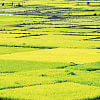Bagerhat Coastal Unions: Boro destroyed as saline water let into fields

Boro paddies grown by a large number of farmers in Bagerhat have been ruined after some politically influential locals released saline water into the fields for the sake of shrimp farming.
The water was released by removing dams and by opening sluice gates.
Many farmers said they had planted the Boro this season after getting support from the Department of Agricultural Extension (DAE), and were expecting to harvest the staple grain in around a month and half.
However, the saline water has completely damaged their standing crops, that too at a time when the government seeks to use every inch of farmland to produce food and cut dependence on the international market amid the Russia-Ukraine war.
Shrimp is grown in the southwest coastal region for export purposes. As black tiger shrimps, which account for the majority of the shrimp exports, grow well in saline water, many owners use their influence to ensure that enough brackish water is coming to their shrimp enclosures -- resulting in a conflict between them and other food producers in the region.
With local administrations taking no steps, farmers particularly in Dema, Rajnagar and Perikhali unions of Bagerhat's Sadar and Rampal upazilas have suffered badly.
Sabita Howladar, of Kalekharber village in Rampal upazila's Rajnagar union, said, "We had requested them repeatedly to wait for a few days before bringing the saline water in from the nearby canal. But they didn't pay heed."
Sabita's family cultivated Boro paddy, a dry season crop harvested in April-May, on six bighas of land after taking a loan from an NGO and selling their cows to get the capital.
"After 15-20 days, we could have taken the paddy home. As they [local influentials] removed the dam, saline water entered our field and our plants started dying," she told this correspondent when he visited the village earlier this month.
Humayun, another farmer of the same village, said the farmers cultivated the paddy as the DAE provided them with seeds and fertiliser free of cost.
The farmers also took the consent of all before building the dam on the Kalekharber canal to prevent saline water from intruding the fields.
"But then some influential people removed the dam to let saline water enter their shrimp enclosures."
However, Rampal Upazila Nirbahi Officer Najibul Alam said no permission was taken by the farmers to erect dams or cultivate paddy, adding that the local chairmen have been given the responsibility to resolve the dispute between Boro farmers and shrimp enclosures owners.
Not only in Kalekharber, Boro farmers of other villages -- Singurbunia, Ranjoypur and Aruadonga, in the same union – have also been suffering.
Farmers in these areas have alleged that shrimp farmers, led by Zulu Hazi, an influential shrimp cultivator of Rajnagar union, have removed the embankments to allow saline water into their enclosures.
Contacted, Zulu said, "We had taken the paddy farmers' consent in this regard. However, we will take necessary steps so that the water cannot enter the paddy fields."
Those in Dema union as well are fearing losses as influential locals have opened up the sluice gates over Chabaki river in Chabaki and Bashbaria areas.
These too were done to let saline water enter shrimp farms.
Md Sujan Sheikh, a farmer of Dema union, said he invested around Tk 70,000 to cultivate Boro on four bighas of land in Kashimpur village.
"My cropland was within the block set up by the Agricultural Extension Department. I have also irrigated the field through the irrigation line established by the agricultural office. Now, due to entry of saline water in the adjacent river, my Boro was affected. It looks like a burnt field."
Several other growers of the union have all had their Boro paddies destroyed by salinity.
Farmers in this coastal district have been showing increased interests in growing Boro over the past several years to ensure their food security ever since the cultivation of Aman, once the only large crop grown there, has been falling gradually.
According to data by the Bangladesh Bureau of Statistics, the acreage of Boro paddy in Bagerhat rose by 28 percent – from 2009-10's 45,459 hectares to 2021-22's 58,315 hectares. Meanwhile, Boro production jumped 62 percent to 2.68 lakh tonnes in last 12 years.
Farmers said they could have had a good yield if the dams hadn't been taken down.
Locals of Dema union alleged that the sluice gates are controlled by the union Awami League President Jahangir Hossain and he was responsible for letting the saline water into the polder area to farm black tiger shrimps, generally grown in brackish water.
Contacted, Jahangir Hossain denied the allegation.
He said the saline water was brought in through sluice gates during Maghi Purnima, a Buddhist festival, with the consent of the farmers.
"The water was fresh at that time and no more water was added later," he said. He also blamed an "unknown disease" for the damage of the paddies.
"Farmers are wrongly blaming saline water."
Md Masum Billah, executive engineer of Bagerhat BWDB, said they had kept the sluice gates closed to make sure saline water could not enter.
"But we don't know who opened the gate and let the water in during the night. I heard a duplicate key was made for this. We are looking into the matter seriously."
Sadia Sultana, agriculture officer of Bagerhat Sadar, on March 24 said some rice plants have died due to high salinity.
"We have tested the soil on the farmers' lands. The salinity in the soil was found to be quite high. As there has been less rainfall, the salinity did not decrease."
She, however, claimed she had not heard about the saline water being released into the fields by influential people.
Bagerhat Sadar Upazila Nirbahi Officer Rubaiya Tasnim said they would inspect the entire area and report the amount of damage.

 For all latest news, follow The Daily Star's Google News channel.
For all latest news, follow The Daily Star's Google News channel. 









Comments